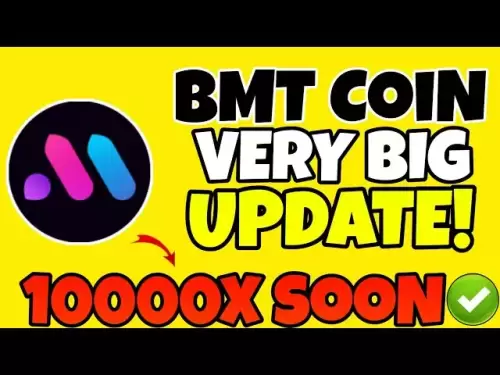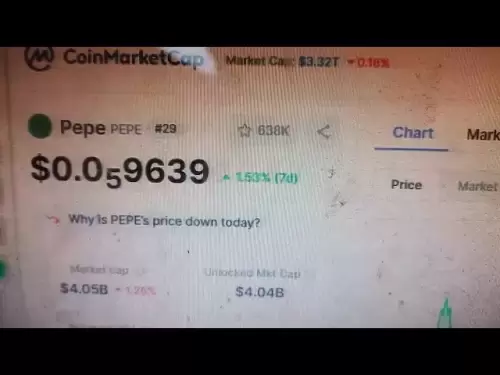-
 Bitcoin
Bitcoin $108,250.0992
0.11% -
 Ethereum
Ethereum $2,515.9404
0.03% -
 Tether USDt
Tether USDt $1.0003
0.00% -
 XRP
XRP $2.2166
-0.19% -
 BNB
BNB $656.5904
0.29% -
 Solana
Solana $147.4122
-0.58% -
 USDC
USDC $1.0000
-0.01% -
 TRON
TRON $0.2830
0.06% -
 Dogecoin
Dogecoin $0.1641
0.27% -
 Cardano
Cardano $0.5739
-0.19% -
 Hyperliquid
Hyperliquid $39.1463
-0.11% -
 Sui
Sui $2.8882
-0.02% -
 Bitcoin Cash
Bitcoin Cash $487.6428
0.31% -
 Chainlink
Chainlink $13.2097
0.07% -
 UNUS SED LEO
UNUS SED LEO $9.0308
0.10% -
 Avalanche
Avalanche $17.8608
0.13% -
 Stellar
Stellar $0.2379
-0.06% -
 Toncoin
Toncoin $2.7400
-0.39% -
 Shiba Inu
Shiba Inu $0.0...01144
-0.36% -
 Litecoin
Litecoin $87.5467
0.66% -
 Hedera
Hedera $0.1538
0.22% -
 Monero
Monero $315.5479
0.36% -
 Dai
Dai $1.0000
0.00% -
 Polkadot
Polkadot $3.3523
-0.71% -
 Ethena USDe
Ethena USDe $1.0003
0.01% -
 Bitget Token
Bitget Token $4.3960
-1.03% -
 Uniswap
Uniswap $7.2663
4.19% -
 Aave
Aave $272.8619
2.04% -
 Pepe
Pepe $0.0...09676
-0.18% -
 Pi
Pi $0.4586
-2.87%
What are the methods to sell Metadium (META) coins?
To trade META securely, explore reputable exchange platforms like Binance or access decentralized exchanges like Uniswap for greater autonomy and non-custodial transactions.
Jan 07, 2025 at 09:08 am

Key Points:
- Understanding the nature of Metadium (META) coins
- Exploring various exchange platforms for META trading
- Familiarizing with decentralized exchanges (DEXs) and their benefits
- Investigating peer-to-peer (P2P) marketplaces for META transactions
- Creating a secure wallet for META storage and transactions
- Utilizing the built-in exchange of the Metadium's dApp ecosystem
- Monitoring reputable news sources for industry updates on META
Methods to Sell Metadium (META) Coins:
- Trading on Centralized Exchanges (CEXs):
CEXs, such as Binance, KuCoin, and Huobi Global, provide a user-friendly interface for META trading. They offer a wide range of trading pairs, including META/USDT, META/BTC, and META/ETH. To trade on a CEX:
- Create an account and complete the KYC/AML verification process.
- Deposit META coins into your exchange wallet.
- Navigate to the META trading pair.
- Enter the amount of META you want to sell, set the order type, and execute the trade.
- Withdraw the sale proceeds to your external wallet.
- Accessing Decentralized Exchanges (DEXs):
DEXs, such as Uniswap and PancakeSwap, offer a non-custodial approach to META trading. Users directly interact with smart contracts, eliminating the need for intermediaries. To trade on a DEX:
- Connect your crypto wallet to the DEX's interface.
- Import the META token contract address and add it to your wallet.
- Set up a liquidity pool for the META/ETH or META/USDT trading pair.
- Place a swap order to sell META for the desired cryptocurrency.
- Utilizing Peer-to-Peer (P2P) Marketplaces:
P2P marketplaces, such as LocalBitcoins and Binance P2P, facilitate direct transactions between buyers and sellers. These platforms escrow the funds, ensuring a secure environment. To sell META on a P2P marketplace:
- Create an account and complete the verification process.
- Post a sale offer, specifying the META amount, price, and payment method.
- Connect with potential buyers and agree on the terms.
- Initiate an escrow transaction, release the META coins to the buyer upon payment confirmation.
- Choosing a Secure Wallet:
Selecting a reputable crypto wallet is crucial for storing META coins securely. Hardware wallets, such as Ledger and Trezor, provide the highest level of security by keeping your private keys offline. Software wallets, such as MetaMask and Exodus, offer convenience but may be vulnerable to online attacks.
- Leveraging the Metadium dApp Ecosystem:
Metadium has developed a dedicated dApp ecosystem, including METAdex, a built-in exchange where users can trade META coins within the dApp. To use METAdex:
- Install the Metadium dApp.
- Create an account and connect your wallet.
- Transfer META coins to your dApp wallet.
- Navigate to the METAdex exchange and place a sell order.
- Monitoring Market News and Updates:
Staying informed about industry news and updates is essential for making informed decisions regarding META trading. Follow reputable news sources, such as CoinMarketCap, Coindesk, and Binance, to track META's price movements, market trends, and regulatory changes.
FAQs:
- What is the minimum amount of META I can sell?
Metamdium does not set a minimum limit for META sales. However, CEXs may impose minimum trade amounts. - Which exchange has the lowest trading fees for META?
Trading fees vary across exchanges. Refer to the fee schedule of each platform to find the most competitive rates. - Is it safe to store META coins on a software wallet?
Software wallets offer convenience, but they may be susceptible to online attacks. Consider hardware wallets for enhanced security. - Can I sell META coins anonymously?
P2P marketplaces can facilitate anonymous transactions, but they may lack the liquidity and security of centralized exchanges.
Disclaimer:info@kdj.com
The information provided is not trading advice. kdj.com does not assume any responsibility for any investments made based on the information provided in this article. Cryptocurrencies are highly volatile and it is highly recommended that you invest with caution after thorough research!
If you believe that the content used on this website infringes your copyright, please contact us immediately (info@kdj.com) and we will delete it promptly.
- Litecoin Breakout Watch: What Traders Need to Know Now
- 2025-07-06 16:50:13
- Bitcoin, Solana, Ethereum: Decoding the Latest Buzz on the Blockchain
- 2025-07-06 16:50:13
- Widnes Resident's 50p Could Be Your Ticket to Easy Street: Rare Coin Mania!
- 2025-07-06 16:55:13
- Bitcoin, Solaris Presale, and Token Rewards: What's the Buzz?
- 2025-07-06 16:55:13
- Ethereum Under Pressure: Price Drop Amid Global Uncertainties
- 2025-07-06 17:00:13
- XRP, SEC Case, and Prosperity: A New Era for XRP Holders?
- 2025-07-06 17:10:13
Related knowledge

How to customize USDT TRC20 mining fees? Flexible adjustment tutorial
Jun 13,2025 at 01:42am
Understanding USDT TRC20 Mining FeesMining fees on the TRON (TRC20) network are essential for processing transactions. Unlike Bitcoin or Ethereum, where miners directly validate transactions, TRON uses a delegated proof-of-stake (DPoS) mechanism. However, users still need to pay bandwidth and energy fees, which are collectively referred to as 'mining fe...

USDT TRC20 transaction is stuck? Solution summary
Jun 14,2025 at 11:15pm
Understanding USDT TRC20 TransactionsWhen users mention that a USDT TRC20 transaction is stuck, they typically refer to a situation where the transfer of Tether (USDT) on the TRON blockchain has not been confirmed for an extended period. This issue may arise due to various reasons such as network congestion, insufficient transaction fees, or wallet-rela...

How to cancel USDT TRC20 unconfirmed transactions? Operation guide
Jun 13,2025 at 11:01pm
Understanding USDT TRC20 Unconfirmed TransactionsWhen dealing with USDT TRC20 transactions, it’s crucial to understand what an unconfirmed transaction means. An unconfirmed transaction is one that has been broadcasted to the blockchain network but hasn’t yet been included in a block. This typically occurs due to low transaction fees or network congestio...

How to check USDT TRC20 balance? Introduction to multiple query methods
Jun 21,2025 at 02:42am
Understanding USDT TRC20 and Its ImportanceUSDT (Tether) is one of the most widely used stablecoins in the cryptocurrency market. It exists on multiple blockchain networks, including TRC20, which operates on the Tron (TRX) network. Checking your USDT TRC20 balance accurately is crucial for users who hold or transact with this asset. Whether you're sendi...

What to do if USDT TRC20 transfers are congested? Speed up trading skills
Jun 13,2025 at 09:56am
Understanding USDT TRC20 Transfer CongestionWhen transferring USDT TRC20, users may occasionally experience delays or congestion. This typically occurs due to network overload on the TRON blockchain, which hosts the TRC20 version of Tether. Unlike the ERC20 variant (which runs on Ethereum), TRC20 transactions are generally faster and cheaper, but during...

The relationship between USDT TRC20 and TRON chain: technical background analysis
Jun 12,2025 at 01:28pm
What is USDT TRC20?USDT TRC20 refers to the Tether (USDT) token issued on the TRON blockchain using the TRC-20 standard. Unlike the more commonly known ERC-20 version of USDT (which runs on Ethereum), the TRC-20 variant leverages the TRON network's infrastructure for faster and cheaper transactions. The emergence of this version came as part of Tether’s...

How to customize USDT TRC20 mining fees? Flexible adjustment tutorial
Jun 13,2025 at 01:42am
Understanding USDT TRC20 Mining FeesMining fees on the TRON (TRC20) network are essential for processing transactions. Unlike Bitcoin or Ethereum, where miners directly validate transactions, TRON uses a delegated proof-of-stake (DPoS) mechanism. However, users still need to pay bandwidth and energy fees, which are collectively referred to as 'mining fe...

USDT TRC20 transaction is stuck? Solution summary
Jun 14,2025 at 11:15pm
Understanding USDT TRC20 TransactionsWhen users mention that a USDT TRC20 transaction is stuck, they typically refer to a situation where the transfer of Tether (USDT) on the TRON blockchain has not been confirmed for an extended period. This issue may arise due to various reasons such as network congestion, insufficient transaction fees, or wallet-rela...

How to cancel USDT TRC20 unconfirmed transactions? Operation guide
Jun 13,2025 at 11:01pm
Understanding USDT TRC20 Unconfirmed TransactionsWhen dealing with USDT TRC20 transactions, it’s crucial to understand what an unconfirmed transaction means. An unconfirmed transaction is one that has been broadcasted to the blockchain network but hasn’t yet been included in a block. This typically occurs due to low transaction fees or network congestio...

How to check USDT TRC20 balance? Introduction to multiple query methods
Jun 21,2025 at 02:42am
Understanding USDT TRC20 and Its ImportanceUSDT (Tether) is one of the most widely used stablecoins in the cryptocurrency market. It exists on multiple blockchain networks, including TRC20, which operates on the Tron (TRX) network. Checking your USDT TRC20 balance accurately is crucial for users who hold or transact with this asset. Whether you're sendi...

What to do if USDT TRC20 transfers are congested? Speed up trading skills
Jun 13,2025 at 09:56am
Understanding USDT TRC20 Transfer CongestionWhen transferring USDT TRC20, users may occasionally experience delays or congestion. This typically occurs due to network overload on the TRON blockchain, which hosts the TRC20 version of Tether. Unlike the ERC20 variant (which runs on Ethereum), TRC20 transactions are generally faster and cheaper, but during...

The relationship between USDT TRC20 and TRON chain: technical background analysis
Jun 12,2025 at 01:28pm
What is USDT TRC20?USDT TRC20 refers to the Tether (USDT) token issued on the TRON blockchain using the TRC-20 standard. Unlike the more commonly known ERC-20 version of USDT (which runs on Ethereum), the TRC-20 variant leverages the TRON network's infrastructure for faster and cheaper transactions. The emergence of this version came as part of Tether’s...
See all articles

























































































